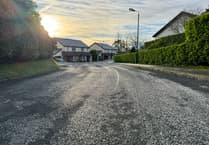One of the largest animal protection organisations in the UK has written to the environment minister asking her to consider humane population control methods for the island’s wallabies.
PETA said that after learning of the Department of Environment, Food and Agriculture’s commissioning of research to studying the population of wild wallabies on the Isle of Man, it has sent a letter to Clare Barber advising against culling as a form of population control – a method the minister has not publicly considered.
It has suggested ‘environmental modification’ by reducing the availability of grasses in cleared areas by replanting with trees, which PETA describes as a ‘simple and highly effective measure’ to control wildlife populations.
Manipulating vegetation is a practical method suggested by the Australian Capital Territory’s government to limit the population growth of kangaroos, a similar marsupial.
‘We understand that the Department for Environment, Food and Agriculture (DEFA) is currently studying the population of wild wallabies on the Isle of Man, and we hope that the report will conclude that if a control policy is needed, humane, non-lethal approaches should be used for living alongside these animals,’ said PETA senior campaigns manager Kate Werner. ‘We will never restore ecological harmony through the barrel of a gun.
‘It’s worth remembering that wallabies are only on the island today because humans brought them here in the first place. We therefore owe it to these animals to find humane ways to manage the population.’
She added: ‘Other successful, non-lethal schemes focus on contraception or sterilisation programmes, such as those used to control certain urban pigeon and deer populations in Vancouver, Canada. Contraceptives were introduced for female black-tailed deer after residents and animal rights groups raised concerns over a planned cull.
‘Wallabies are fascinating herbivores who pose no threat to other animals and who, having been brought here against their will, found a way to survive.
‘We hope to hear from you that if you do intend to interfere with the wallaby population, only modern, non-lethal methods will be used.’
There is no formal policy on the protection of feral wallabies in the island currently.
The minister previously said that there are both ‘risks and opportunities’ that come with implementing a protection strategy and DEFA would need to assess the impact on the community, with much research being required beforehand.


.jpeg?width=209&height=140&crop=209:145,smart&quality=75)


Comments
This article has no comments yet. Be the first to leave a comment.